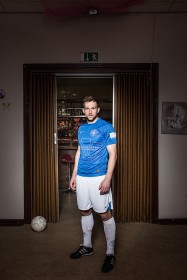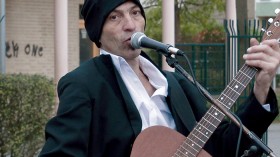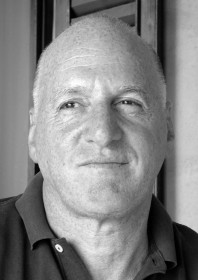The 14th European Maccabi Games (EMG) are beginning tomorrow, 27 July 2015, in Berlin. More than 2,000 Jewish athletes from 36 countries will compete in 19 sports from football to fencing to chess. To accompany the games Tamar Lewinsky and Theresia Ziehe are producing a series of portraits with interviews, introducing a new member of the German delegation from Berlin every day here on the blog. They conducted the interviews on the grounds of the TuS Maccabi in Berlin’s Grunewald where Stephan Pramme also shot the portraits.
Alec-Ilya Pivalov (28), soccer

Alec-Ilya (28), soccer © Jewish Museum Berlin, photo: Stephan Pramme
Alec, why are you taking part in the European Maccabi Games?
It’s a terrific athletic event where you can meet a lot of interesting people from many different countries. By now there’s also a familial atmosphere in the German delegation so it’s just really nice to have the opportunity to participate. And of course it makes you and your family proud.
In 1936, Jewish athletes weren’t permitted to participate in the Olympic Games. Does the fact that some of the competitive events will take place in Berlin’s Olympic grounds – which were built for that Olympics – play a personal role for you?
There is an ambivalence because of course I know the history of this stadium. But in the meantime I associate it with other events: → continue reading
It always goes by so quickly: it feels as if the third round just started, of the art vending machine in the Jewish Museum Berlin’s permanent exhibition. But in fact it’s almost finished and sold out – 2,600 items since April! That’s certainly enough reason to pop by to visit Howard Katz and ask him some questions, especially considering that he was the first of the now 22 artists we’ve featured to use music…

Howard Katz © Yoann Trillu
Dagmar Ganßloser: Howard, you work as an artist in many different genres. You’re a dancer, performer, and choreographer, but you’re also an active visual artist, and on top of that a singer-songwriter. Right now the art vending machine has your “Mix Tape” as well as “4 short films”. How did you choose those?
Howard Katz: It was clear to me from the start that I wanted to present my music in the art vending machine. The 17 songs on “Mix Tape” came into being over the last twenty years plus and – the same as “4 short films” – they’re mainly about experiences I’ve had since I’ve lived in Berlin, so since the mid-1990s. The production was uncomplicated and I made the selection intuitively, from the heart. I made the four videos for my songs completely on my own, with my telephone – it was an opportunity to try out something new. → continue reading

The author © David Ranan
For his book, “The shadows of the past are still long: Young Jews on their lives in Germany,” culture researcher, David Ranan, conducted interviews with Jews between 20-40 whose grandparents survived the Holocaust and then settled in Germany after the war. The London-based author will present his book at the Academy of the Jewish Museum Berlin on 7 July 2015, as part of the “New German Stories” series. In advance, we asked him three questions.
Julia Jürgens: Mr. Ranan, one question you asked your interviewees deals with the “packed luggage” the first and second generation seem to have at the ready, an expression of their inner conflict between being able to safely stay or having to again flee. Is there still this conflict within the third generation or how else would you describe its sense of belonging to Germany? → continue reading


